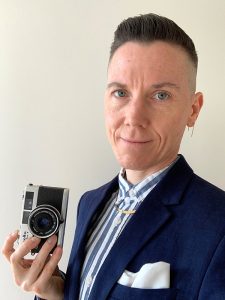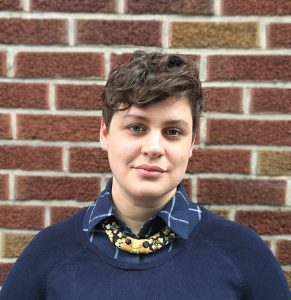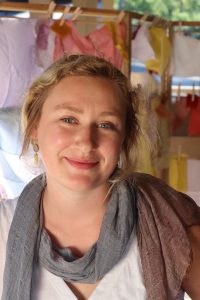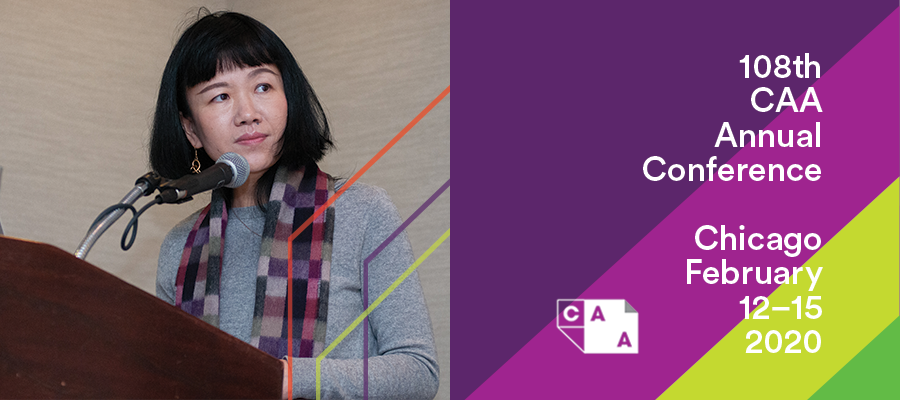CAA News Today
An Update on the 2021 Annual Conference
posted by CAA — July 16, 2020
Dear CAA Members,
As you will hear Meme Omogbai, CAA executive director, say time and time again, “Mission first. People always.” So we start this letter with the wish that you are safe, healthy, and finding some time for self-care this summer.
We are writing to share where we are in planning the 109th CAA Annual Conference. We had hoped to celebrate the vast scholarship and practice of CAA members at a fully in-person conference in New York this February 10–13, 2021. The COVID-19 pandemic and the uncertainty of the months ahead—as well as increasing economic pressures on institutions and individuals, leading to diminished funds for professional development and travel—have caused us to rethink our plans.
We are now moving to a conference format that will include session content online. There are many factors in determining the costs and benefits to going online; these are currently being worked on by CAA staff and will continue to be addressed as we move forward. But making this decision now allows staff and the Annual Conference Committee time to plan for an iteration of the conference that will ensure the core benefits of the event are maintained: opportunities to share new research, listen to esteemed artists, designers, and scholars, and connect with peers. We are also looking at ways to present the in-person activities, dependent upon the state of the pandemic in early 2021. Thank you for your patience and flexibility over the next couple of months as the planning continues. We are creating a list to address your frequently asked questions; please email questions to programs@collegeart.org or to us personally.
SEE FAQS FOR 2021 ANNUAL CONFERENCE
Our decision was informed by a robust response (almost 1,200 replies!) to a survey sent to members in May regarding their ideas about CAA hosting an online conference. Exceptionally useful feedback was provided in terms of what types of activities would be appealing to attend online, the value of in-person gatherings, and what price points seem reasonable. We are building on what you shared with us.
The Annual Conference Committee is currently reviewing the 800-plus proposal submissions and is on schedule to select those that will be included in the conference program. Our committees and staff are working hard to create a diverse and inclusive program and one that is broadly accessible.
While this time is filled with uncharted unknowns and anxieties, this is also an opportunity for us to build the organization that we want CAA to be. If you have the ability to give, we ask for your generosity. If you are able to give financially, wonderful—we need that help. Donations are not the only way to participate in our organization, however. We want your energy and your ideas. If you have connections and resources to share, we welcome them. If you know people who could benefit from our community, please spread the word. We are an organization of members. Join us.
CAA is an incredible coalition of individuals and institutions. If we have learned anything from the pandemic, it is that virtual platforms can allow us to communicate broadly and across borders. Difficult conversations can take place and together we can move forward and create an organization that advocates, shares, and brings others along with us.
Sincerely yours,

N. Elizabeth Schlatter
President, CAA
Deputy Director, University of Richmond Museums, Virginia
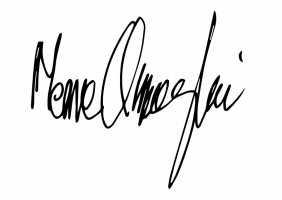
Meme Omogbai
Executive Director and CEO
The Getty Foundation to Fund the CAA-Getty International Program for a Tenth Year
posted by CAA — June 25, 2020
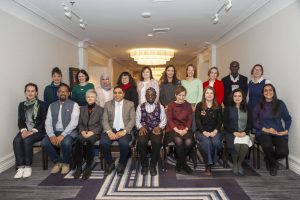
CAA-Getty Scholars at the 2020 Annual Conference in Chicago. Photo: Stacey Rupolo
The Getty Foundation has awarded CAA a grant to fund the CAA-Getty International Program for a tenth consecutive year. Unlike previous years, the 2021 program will take place virtually, due to the COVID-19 pandemic and the challenges of bringing international scholars to New York to attend the 2021 Annual Conference. CAA is especially grateful to the Getty Foundation for sustaining its support during these uncertain times, when maintaining contact with our international colleagues is more important than ever. Turning this crisis into an opportunity, the twenty participants in next year’s program will spend the time between now and February exploring the advantages of online technology for enriching scholarly research and building global bonds. Meme Omogbai, CAA’s new executive director, stated “We appreciate not only the Getty Foundation’s ongoing support, but also its faith in the CAA-Getty program to pursue scholarly excellence and innovation in an acutely challenging time. We believe the participants in this program will help lead the way for CAA’s future growth in international programs and membership.”
Over the coming months, the participants—all alumni of the program—will work in small online groups to workshop their conference papers, originally planned to be presented in person at the 2021 Annual Conference. What can be gained by geographically-distanced scholars collaborating regularly over the next six months, discussing and critiquing each other’s work? How will ideas evolve and change from early conversations to completed presentations?
The 2021 CAA-Getty program participants will also explore opportunities provided by online exchanges to produce resource materials for other scholars. Using recordings of the online discussions and the conference presentations, the group will initiate a virtual archive containing video and text documentation of the year’s work, including podcasts, bibliographies, and references related to the themes of the conference sessions. Although this virtual program breaks with the patterns established by the first nine years of the program, its forward-looking experiment in online scholarship is a fitting way to celebrate the tenth anniversary of a program that promises new models for robust scholarship in the post-COVID world.
“We applaud CAA for a taking a bold step to reimagine the international program online,” says Joan Weinstein, director of the Getty Foundation. “This thoughtful approach to digital engagement will teach us all a great deal about how to maintain international perspectives and connections in this new post-pandemic reality.”
The CAA-Getty International Program was established in 2011-12 to increase international participation in CAA and the CAA Annual Conference. The program fosters collaborations between North American art historians and curators and their international colleagues and introduces visual arts professionals to the unique environments and contexts of practices in different countries. Since the CAA-Getty International Program began, it has brought 135 first-time attendees from 49 countries to CAA’s Annual Conference. Historically, the majority of international registrants at the conference have come from Canada, the United Kingdom, and Western European countries. The CAA-Getty International Program has greatly diversified attendance, adding scholars from Central and Eastern Europe, Russia, Africa, Asia, Southeast Asia, the Caribbean, and South America. The majority of the participants teach art history, visual studies, art theory, or architectural history at the university level; others are museum curators and researchers.
About the Getty Foundation
The Getty Foundation fulfills the philanthropic mission of the Getty Trust by supporting individuals and institutions committed to advancing the greater understanding and preservation of the visual arts in Los Angeles and throughout the world. Through strategic grant initiatives, it strengthens art history as a global discipline, promotes the interdisciplinary practice of conservation, increases access to museum and archival collections, and develops current and future leaders in the visual arts. It carries out its work in collaboration with the other Getty Programs to ensure that they individually and collectively achieve maximum effect.
2021 CAA-Getty International Program Participants
Danielle Becker, Stellenbosch University, South Africa
Federico Freschi, Otago Polytechnic, New Zealand
Georgina Gluzman, University of Buenos Aires, Argentina
Richard Gregor, Trnava University, Slovenia
Alison Kearney, University of the Witwatersrand, South Africa
Sandra Krizic Roban, Institute of Art History, Croatia
Peju Layiwola, University of Lagos, Nigeria
Daniela Lucena, University of Buenos Aires, Argentina
Priya Maholay-Jaradi, National University of Singapore
Ana Mannarino, Federal University of Rio De Janeiro, Brazil
Parul Mukherji, Jawaharlal Nehru University, India
Cristian Nae, George Enescu National University of Arts, Romania
Marton Orosz, Museum of Fine Arts, Hungary
Ceren Ozpinar, University of Brighton, United Kingdom
Dasha Panaiotti, Hermitage Museum, Russia
Valeria Paz Moscoso, Universidad Católica Boliviana San Pablo, Bolivia
Judy Peter, University of Johannesburg, South Africa
Horacio Ramos Cerna, City University of New York
Nora Veszpremi, University of Birmingham, United Kingdom
Giuliana Vidarte, Pontifical Catholic University, Peru
Serve on a CAA Jury and Provide Support to the Field
posted by CAA — June 24, 2020
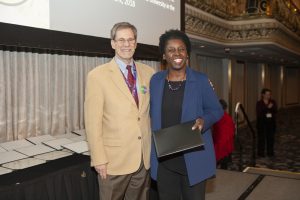
Former CAA Interim Director David Raizman and Denise Murrell, who received the Alfred H. Barr Jr. Award for Smaller Museums, Libraries, Collections, and Exhibitions for her catalog Posing Modernity: The Black Model From Manet and Matisse to Today, at the 2020 Annual Conference in Chicago. Photo: Stacey Rupolo
CAA invites nominations and self-nominations for individuals to serve on our Awards for Distinction, Publication Grant, Fellowship, and Travel Grant juries. Terms begin August 2020.
Candidates must possess expertise appropriate to the jury’s work and be current CAA members. They should not hold a position on a CAA committee or editorial board beyond May 31, 2020. CAA’s president and vice president for committees appoint jury members for service.
Awards for Distinction Juries
CAA has vacancies in ten of the fourteen juries for the annual Awards for Distinction for three years (2020–23). Terms begin in August 2020; award years are 2021–23.
- Alfred H. Barr Jr. Award for museum scholarship in the history of art/Alfred H. Barr Jr. Award for Smaller Museums, Libraries, Collections, and Exhibitions for museum scholarship in the history of art published by smaller institutions: two vacancies
- Frank Jewett Mather Award for art criticism: two vacancies
- Charles Rufus Morey Book Award for non-catalogue books in the history of art: one vacancy
- Arthur Kingsley Porter Prize for articles written by younger scholars in The Art Bulletin: one vacancy
- Artist Award for Distinguished Body of Work: two vacancies
- Distinguished Artist Award for Lifetime Achievement: one vacancy
- Distinguished Feminist Awards for Scholars and Artists: one vacancy
- Distinguished Teaching of Art History Award: one vacancy
- Excellence in Diversity Award: four vacancies
Publication Grant Juries
CAA has vacancies on our Millard Meiss Publication Fund grant jury for four years (2020–24) and the Terra Foundation for American Art Publication Grant jury for one year (2020-21).
- Millard Meiss Publication Fund: three vacancies
- Terra Foundation for American Art Publication Grant: one vacancy
Professional Development Fellowship Juries
CAA has vacancies on our Professional Development Fellowship juries for three years (2020–23). Terms begin August 2020.
- Professional Development Fellowship in Visual Arts: three vacancies
- Professional Development Fellowship in Art History: two vacancies
Travel Grant Juries
CAA has vacancies on our Art History Fund for Travel to Special Exhibitions jury for three years (2020–23). Terms begin August 2020.
- Art History Fund for Travel to Special Exhibitions: two vacancies
HOW TO APPLY
Nominations and self-nominations should include a brief statement (no more than 150 words) outlining the individual’s qualifications and experience and a CV (an abbreviated CV no more than two pages may be submitted). Please send all materials by email to Cali Buckley (cbuckley@collegeart.org), CAA grants and special programs manager; submissions must be sent as Microsoft Word or Adobe PDF attachments.
For questions about jury service and responsibilities, contact Tiffany Dugan (tdugan@collegeart.org), CAA director of programs and publications.
Deadline: July 31, 2020
CAA-Getty International Program at CAA 2020
posted by CAA — March 17, 2020
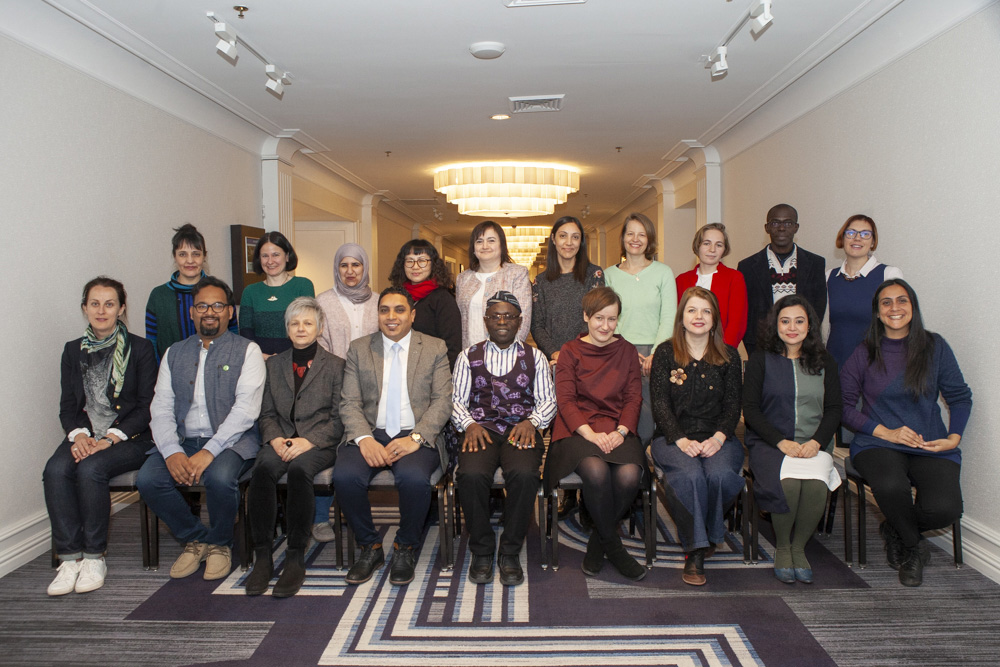
2020 CAA-Getty International Program Participants, photo by Stacey Rupolo.
Front row, left-right: Julia Waite (New Zealand), Saurabh Tewari (India), Daria Jaremtchuk (Brazil), Ali Mahfouz (Egypt), Akande Abiodun (Nigeria), Aleksandra Paradowska (Poland), Iro Katsaridou (Greece), Priya Maholay-Jaradi (Singapore), Giuliana Vidarte (Peru); Back row, left-right: Valeria PazMoscoso (Bolivia), Nora Veszpremi (Hungary/UK), Eiman Elgibreen (Saudi Arabia), Pedith Chan (Hong Kong), Mariana Levytska (Ukraine), Daniela Lucena (Argentina), Katarzyna Cytlak (Poland), Daria Panaiotti (Russia), Jean-Arsène Yao (Côte d’Ivoire), Irene Bronner (South Africa); Not pictured: Ganiyu Jimoh (Nigeria)
One for the Scrapbook! The 2020 CAA-Getty International Program participants—twenty scholars from nineteen countries—arrived in Chicago on the Sunday before the conference to get ready for a busy week of meetings, sessions, and one-on-one conversations. With this year’s participants, the program now includes 135 scholars from 48 countries, adding for the first time representatives from Bolivia, Singapore, and Côte d’Ivoire.
The preconference colloquium on February 11 was held at the School of the Art Institute of Chicago and featured papers on indigenous artists and contemporary art, the politics of cultural heritage, new subjects for art history, artistic exiles, and critical pedagogies.
Eleven US-based CAA members served as hosts for the international visitors, introducing them to scholars in their fields, taking them to Chicago-area museums, and attending their preconference colloquium.
Toward the end of the week, five alumni added their voices to the annual Global Conversation session, this year addressing Art History and the Politics of Vision.
As Julia Waite, from New Zealand, summarized the week: “Attending the CAA conference was hugely stimulating, and I left feeling excited about the future of art history. It reminded me of the strengths of deep art historical research in providing a more complex and nuanced understanding of art and society.”
CAA Invites Proposals Related to Climate Crisis at 2021 Annual Conference
posted by CAA — February 26, 2020

Fridays For Future protest in Toronto, Canada. Photo: Jasmin Sessler
As part of the 2021 Annual Conference, CAA seeks to offer a selection of sessions, papers, speakers, and related programming on the topic of Climate Crisis. Including but going beyond eco-art and eco-criticism, and with climate justice and intersectional thinking as priorities, panels and presentations can address ecology as a matter of the content of artworks, but also, and pressingly, how we—artists, designers, and art historians, institutional stakeholders and independent practitioners, and members of allied fields—can and should change our professional practices in light of the crisis.
We invite discussions of creative interventions into the status quo, up to and including a serious discussion of ways of reducing the carbon footprint of the annual conference itself, while preserving and enhancing access. Practices and themes may include remediation and amelioration, thematic representation and critique, the ramifications of change for institutions and collections, issues of preservation, and the nature of research. We invite radical and practical proposals. The conference content will stress a broad and inclusive conversation on climate crisis impact through the lens of age; gender; nationality; race; religion; and socioeconomic status among others.
Thank You for CAA 2020! What Did You Think?
posted by CAA — February 17, 2020
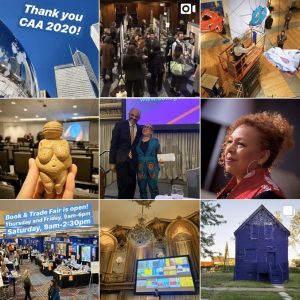
See more highlights @caavisual.
Thank you to the thousands of participants who contributed to the 108th Annual Conference! You can see highlights on our Twitter and Instagram feeds and via the #CAA2020 hashtag.
If you attended CAA 2020, we want to hear from you. Let us know what worked, what didn’t, and what you’d like to see next year in our online survey. All survey respondents are eligible to be entered into a drawing for a free year-long membership.
We appreciate your feedback and hope to see you next year in New York, February 10-13, 2021! The submissions portal for CAA 2021 opens March 1.
Meet the 2019 Professional Development Fellows
posted by CAA — February 14, 2020
CAA is pleased to announce the recipients of the 2019 Professional Development Fellowships. The recipient of the $10,000 fellowship in art history is Ace Lehner, University of California, Santa Cruz. The recipient of the $10,000 fellowship in visual art is Leah Schretenthaler, University of Wisconsin-Milwaukee.
The honorable mention for art history goes to Anne Marie Butler, Kalamazoo College, and the honorable mention in visual art is awarded to Madelaine Corbin, Cranbrook Academy of Art. All fellows and honorable mentions receive a complimentary one-year CAA membership and registration for the 2020 Annual Conference in Chicago.
2019 Professional Development Fellowship in Art History
Ace Lehner, University of California, Santa Cruz
Ace Lehner is an interdisciplinary scholar and artist specializing in critical engagement with identity and representation; history, theory, and criticism of contemporary art; photography theory; and queer and trans theory. Lehner’s artistic practice often embraces collaboration and primarily utilizes photography and video to mine the complex relation between representations and the constitution of identities. Lehner was recently a Presidents’ Dissertation-Year Fellow at the University of California, Santa Cruz, where they are completing their dissertation, ”Trans Representations: Contemporary Art Photography and Non-Binary Visual Theory,” and earning their PhD.
Lehner has chaired panels on trans representations at the College Art Association conference has spoken about their research and artistic practice at the International Center of Photography (New York, NY) and has been published in Art Journal, REFRACT, The Wattis Institute for Contemporary Art, The Journal on Images and Culture, and elsewhere. Lehner’s artwork has been exhibited internationally and will be featured in a solo exhibition at Practice Gallery in Philadelphia in June 2020. Lehner currently serves as the editor of the forthcoming book From Self-Portrait to Selfie: Contemporary Art and Self-Representation in the Social Media Age published by MDPI Books and works in the Education Department at the Dia Foundation and the Museum of Modern Art in New York, NY, where they are currently piloting the museums’ first-ever queer tour programs. Lehner holds an MFA/MA in Fine Art/Visual and Critical Studies from California College of the Arts. Lehner is based in Brooklyn, New York.
Honorable Mention in Art History
Anne Marie Butler, Kalamazoo College
Anne Marie Butler is Assistant Professor of Art History and Women, Gender, and Sexuality at Kalamazoo College, Kalamazoo, MI. Her research areas are global contemporary art, Middle East North Africa studies, gender and sexuality studies, and queer theory. Her scholarship considers issues of gender, sexuality, and queerness within the parameters of the nation-state, and the imbrication of state authority within social constructs. She is currently working on a book project about surrealism in Tunisia, in which she considers emerging and ongoing questions about how Tunisian artists critique embedded systems of power by examining surrealism as a methodology by which Tunisian women artists negotiate the discordant demands of the state apparatus and social norms. Additional scholarship in progress on contemporary Tunisian visual art addresses the overlap of surrealism and queerness, sexuality in surrealism, contemporary performance art, and negotiations of repression. She is also an activist who has worked in migrant justice and local LGBTQ history. In 2018, she founded the Middle East Studies Association Queer Studies Interest Group.
Dr. Butler received her MA from New York University and her PhD from the University at Buffalo. Her dissertation, “Unintelligible Bodies: Surrealism and Queerness in Contemporary Tunisian Women’s Art” (2019), revealed that many Tunisian women artists imagine queer bodies, bodily configurations, and bodily relationships that rebuke normative conceptualizations of the body, and argued that surrealism and queerness are strategies by which Tunisian women artists launch critiques of repressive systems that remain embedded within the Tunisian state and society.
2019 Professional Development Fellowship in the Visual Arts
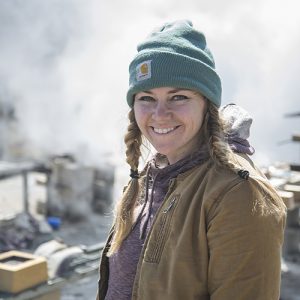 Leah Schretenthaler, University of Wisconsin-Milwaukee
Leah Schretenthaler, University of Wisconsin-Milwaukee
Leah Schretenthaler was born and raised in Hawaii. After relocating to the mainland, Hawaii continues to be a point of reference for her research and studio practice. Her work uses traditional photography, laser etching, and metal casting to create images. Through her art practice, her research presents a connection between land, material, and performance. Her ongoing series, The Invasive Species of the Built Environment, focuses on the controversial builds of her home state.
Schretenthaler completed her BFA degree from the University of South Dakota and holds a master’s degree in art education from Boston University. She is currently an MFA candidate. Recently she has been named one of LensCulture’s Emerging Talents of 2018 and was awarded second place in the Sony World Photography Awards. In 2019, she was awarded the Rhonda Wilson Award through FRESH2019 at the Klompching Gallery. In the of fall 2019 she received the Film Photo Award. Her work has been displayed nationally and internationally including Kahilu Theater (Waimea, HI), Washington Pavilion (Sioux Falls, SD), Manifest (Cincinnati, OH), The Rhode Island Center for Photographic Arts (Providence, RI), Center for Fine Art Photography (Fort Collins, CO), and SOHO Gallery (New York, NY), as well as the Somerset House (London).
Honorable Mention in Visual Art
Madelaine Corbin, Cranbrook Academy of Art
Madelaine Corbin is a multi-disciplinary artist based in Detroit, Michigan. She received her BFA from Oregon State University where she was an artist-in-residence in the departments of Inorganic Chemistry and Microbiology. Recent awards include the Haystack Mountain School of Crafts Stuart Thompson Fellowship, the President’s Award in Sustainability bestowed by Cranbrook Academy of Art, and the Sponenburgh Travel Award granted by Oregon State University.
Corbin’s practice is an archaeological journey to unearth the space between home and land, human and non-human, wild and managed landscapes, and the connection to one another through geographic distance. A fleck of ash, drop of blue, grain of salt, speck of dust, and particle of soil—a constellation of meaning is composed from these elements. Corbin’s practice earnestly endeavors to listen to, translate, and contextualize the conversation between the vibrancy of matter sensed by our fingertips and the expansive questions cultivated by the equally vast universe around. Spaces that invite wonder and interdisciplinary research coalesce to question the quotidian materials accepted as ‘normal’ when few things are actually so. Dirt, salt, and dust are not so simple. Interminable investigations into subterranean histories, values, politics, sciences, fictions, and natural phenomena re-evaluate the inherent meanings embedded in matter. Using her own relationship to ecology rooted in a valley town in Oregon as a starting point, Corbin articulates the complexity and range of relationships to the land beneath our feet, that which once was, and that which will never be.
About the Professional Development Fellowship
CAA’s Professional Development Fellowship program supports promising artists and art historians who are enrolled in MFA and PhD programs nationwide. Awards are intended to help them with various aspects of their work, whether for job-search expenses or purchasing materials for the studio. CAA believes a grant of this kind, without contingencies, can best facilitate the transition between graduate studies and professional careers. The program is open to all eligible graduate students in the visual arts and art history. Applications for the 2021 fellowship cycle will open in the late spring. Learn more.
Welcome to the 2020 Annual Conference
posted by CAA — February 12, 2020
The 108th CAA Annual Conference begins today in Chicago! Welcome to the thousands of CAA members, colleagues, and friends who will be there. If you’re attending, make sure you have downloaded the CAA 2020 app, which is your go-to resource for personalizing your schedule and connecting with others at the conference. There is also a desktop version and printable PDF of the schedule available here.
Want to attend but haven’t registered? Onsite registration is available, and thanks to generous support from the Carl & Marilynn Thoma Art Foundation, we’re happy to offer a Pay-as-you-Wish Day Pass on Friday, February 14th.
Not at the conference? See what’s happening on Twitter, Instagram, and Facebook, and join in the discussion online using using #CAA2020.
CAA staff is on-the-ground at the Hilton Chicago, so website updates and email replies may be delayed. Thanks for your understanding!
CWA Picks for CAA 2020
posted by CAA — February 05, 2020
In lieu of the Committee on Women in the Arts’ monthly write ups on select exhibitions, programs and scholarship that explore gender issues, feminist practices and the work of women artists from around the world and the United States, this month’s picks will focus on local highlights during the 2020 Annual Conference in Chicago.
Among them we would like to highlight the performance program curated by Out of Site Chicago for CWA’s Reception at HAUS and the Hokin Gallery, Columbia College Chicago during CAA 2020 on Thursday February 13. For more information and to RSVP, click here.
The evening celebrates the centennial of US women’s suffrage and the 50% women-centered content of this year’s conference, marking this monumental occasion while also acknowledging the discriminatory practices that limited voting rights for indigenous women and women of color, even after the passage of the 19th amendment. Seeking to extend conversations on gender, race, class and equality from a local and transnational perspective in light of the fraught history of inclusion in the US and this CWA-spearheaded initiative, Out of Site brings together two riveting, thought-provoking performances by Chicago-based artists Wannapa P-Eubanks and Alexandria Eregbu.
The 50/50 initiative’s spirit and the critical commemoration of US women’s suffrage underpin also several of the participatory projects and workshops of the 2020 ARTexchange program and exhibition that can be also explored during the CWA Reception. Elizabeth Cady Stanton’s 19th-century women’s suffrage address “Solitude of Self” is, for instance, the focus of Carol Flueckiger’s drawing workshop Solitude of Selfie, while the underside of the movement is addressed in UNDERBELLY, a participatory performance by Jennifer Natalya Fink and Julie Laffin. Click here to participate in this modern suffragette parade. For complete list of artists and workshops of 2020 ARTexchange click here.
CWA PICKS FOR CAA 2020 IN CHICAGO
Woman Made Gallery
Woman Made Gallery is a tax-exempt, not-for-profit organization founded in 1992. Its goal is to cultivate, promote and support the work of female-identified artists by providing exhibition opportunities, professional development, and public programs that invite discussion about what feminism means today.
Link
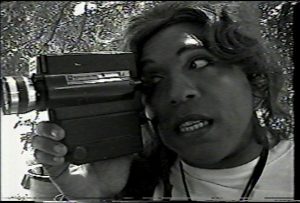
Vaginal Davis as G.B. Jones in Beggars of Life segment of The White to be Angry, 1999
Photo by John AES Nihil of Aesthetic Nihilism Pictorial
Vaginal Davis: The White to be Angry at the Art Institute Chicago
at the Art Institute Chicago
February 1 – April 26, 2020
Link
Mika Rottenberg: Easypiecesat
at the Bergman Family Gallery
October 2, 2019 – March 8, 2020
Link
Female Trouble: Amanda Joy Calobrisi, Lilli Carré, Qinza Najm, Kathryn Refi, Frances Waite
at Western Exhibitions
January 10 – February 22, 2020
Link
Margie Criner: Mind Over Matter
at Bert Green Fine Art
January 11 – February 22, 2020
Link
Candida Alvarez: Estoy Bien
at Monique Meloche Gallery
February 1 – March 28, 2020
Link
American Medina: Stories of Muslim Chicago
at Chicago History Museum
Link
Why women should vote
at Jane Addams Hull House
Link
True Peace: the presence of justice
at Jane Addams Hull-House Museum
Link
Facing Freedom in America
at Chicago History Museum
Link
Beth Foley
at Gallery Victor Armendariz
January 10 – February 28, 2020
Link
Weaving Beyond the Bauhaus
at the Art Institute Chicago
August 3, 2019 – February 17, 2020
Link
Robyn O’Neil: The Tapestries
at Western Exhibitions
January 10 – February 22, 2020
Link
Memorial Celebration for Professor Victor Margolin at CAA 2020
posted by CAA — February 05, 2020
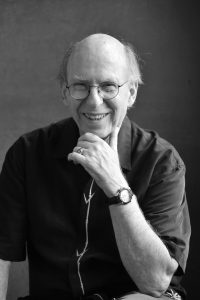
Image courtesy Bend Design Conference.
Please join us for a Memorial Celebration for Professor Victor Margolin during the 2020 Annual Conference on February 12, 2020.
Memorial Celebration for Professor Victor Margolin
Wednesday, February 12, 2020
5:30-7:30 pm
Resident’s Dining Room
Jane Addams Hull House
800 S. Halsted Street
Chicago, Illinois
If you’d like to attend, please RSVP to Rebecca Houze: rhouze@niu.edu
Victor Margolin (1941-2019) was Professor Emeritus of Design History at the University of Illinois at Chicago. He served on the CAA Board of Directors from 1993 to 1997 and was a frequent presenter and session chair at CAA’s Annual Conferences. He promoted the study of design and design history by encouraging the work of others and contributing to the activities of the Design Studies Forum. He was honored with Lifetime Achievement Awards for design research from LearnXDesign (2015) and the Design Research Society (2016). Victor was a founding editor of the academic design journal Design Issues. Books that he has written, edited, or co-edited include The Struggle for Utopia: Rodchencko, Lissitzky, Moholy-Nagy, 1917-1936; Design Discourse; The Designed World: Images, Objects, Environments; and The Politics of the Artificial: Essays on Design and Design Studies. He also edited and co-edited important volumes of essays on design titled Design Discourse (1989), The Idea of Design (1995) Discovering Design (1995) and The Designed World: Images, Objects, Environments (2002). The first two volumes of his World History of Design were published in April 2015.
In the words of his colleague and co-editor Bruce Brown, “Victor was a man of immense intellectual generosity and he mentored scholars young and old around the world. He was always a reasoned advocate of design as a tool to create societies that were more just, equitable and compassionate. These values were accompanied by a keen mind and twinkling eye that drew Victor to people all over the world. His deep humanity, ideas and insights will live on through books and essays to inspire future generations of designers.”
The Jane Addams Hull-House Museum is located on the campus of the University of Illinois at Chicago, 800 S. Halsted Street, Chicago. It is easily reached by public transportation using the UIC Halsted stop on the Blue Line or the Halsted Bus (#8), or via the Eisenhower Expressway (I-290) and the Dan Ryan Expressway (I-90). Parking is available at the Halsted and Taylor Street garage.



